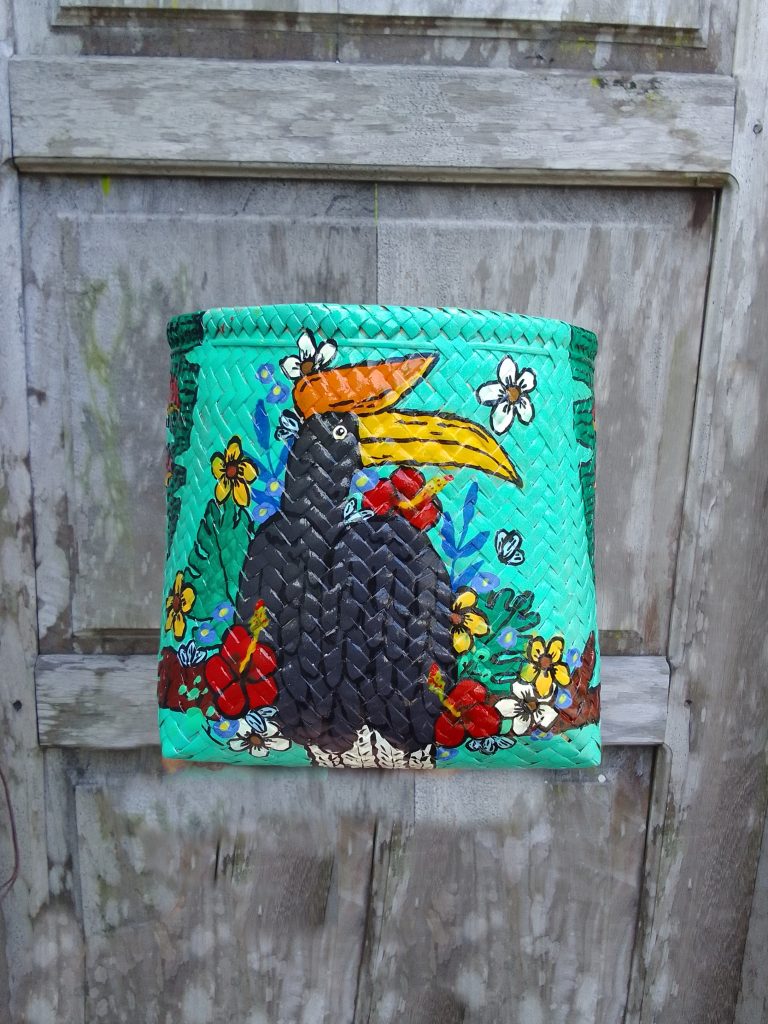The Indonesian handmade crafts industry is no stranger to woven bamboo bags. Due to their practicality and affordability, it is almost a guarantee that all Indonesians, especially women, own at least one of these types of bags. Because of this commonality, however, lots of artists and vendors have to explore their creativity in order to create products that are not only unique in their quality but also in their form.

When one thinks of functional woven purses, they usually come in a mature, elegant or classical fashion. Opting for opulence rather than fun. People usually prefer to purchase those that can be used in formal settings, such as weddings or ceremonies, or maybe paired with traditional attire. This is why it comes as no surprise that the appeal for such an accessory often falls on an older demographic rather.
Enter Dina Adelia, with her painted woven bamboo bags that come in an eclectic array of styles, hoping to change the perception of this classic craft.
Bright and vivid in colour, featuring light-hearted and cartoonish paintings depicting various folklore from the island of Sumatra, traditional clothing, and flora and fauna endemics in Indonesia. Dina Adelia with her shop ‘Ayumu Gendouts’ is bringing the new, funky, modern and striking form of woven bamboo bags that are beguiling to the eyes of Millenials and Gen-Zs who want to preserve the Indonesian heritage while maintaining their own personal unique and unconventional styles.

‘Ayumu Gendouts’ as a name is already a daring statement. Derived from the Japanese idiom ‘ayumu endou’ meaning “path chosen to be traversed”, with a little twist on the last word that the artist/owner transformed to ‘Gendouts’, highlighting the body-positive reclamation of what once was a term with negative connotations. The name of the brand reflects its spirited and valiant style, brave to be bold and stand out, breaking out of the norm, and almost rebellious in its existence.
Even the first few steps this brand took were considered risky. Originally, these traditional baskets from Jambi, are used as compartments for storing rice and spices which are sent to grieving families. So, changing its main function into a personal fashionable bag is certainly unconventional. Ayumu Gendouts procured these woven bags directly from the local vendors in the Rantau Panjang Village.
The first step is sketching the models; some consumers prefer the original rounded basket version, while others want a more practical, wider, rectangular style, complete with zippers and handles. The design is sent to a third party that gathers the vendors and connects them to the shop, then they create these bags exactly as requested. The delivered woven crafts are then heat-dried in a kiln until no moisture from the bamboo is left. This method is crucial to maintain the quality and strength of the bag.



Next comes the process that makes these products really standout: the painting. Ayumu Gendouts’ naive art style is what makes the brand striking and unique. Unconventional, raw and free from restrictions, almost childlike in its simplicity, this style of painting brings out the inner child of the artist and its beholders. Many buyers are intrigued with these bags because the artwork reminds them of the happy, nostalgic memories they have of their childhood. In most practices, naive art and folklore are intertwined, Ayumu Gendouts follows that tradition by painting stories highlighting Indonesia’s heritage. From depicting the process of Malemang, where villagers gather together to cook lamang, sticky rice cooked inside a bamboo shoot to the story of the Sumatran Tiger. Ayumu Gendouts woven bags are storytellers as much as they are fashion items.
After painting, comes the coating process, which protects the acrylic paints from melting or changing their colour. The last step is adorning the product with additional details like zippers, fabrics inside the bags and the handles. Each bag takes about three days to create, and the entire process from start to finish is all made and painted by hand. Not a single product is identical to another, each bag is bespoke, there’s only going to be one of each in the world.
Ayumu Gendouts sold their first product in Jambi in 2020, but the business really started to take off when it was introduced to INACRAFT in 2022, Indonesia’s biggest handicraft bazaar. Since then numerous invitations to join fairs and bazaars have come in and now Ayumu Gendouts is a familiar presence in local exhibitions around Jakarta. Some requests from Milan and New York are beginning to flock in too, it is apparent that the next mountain for this rising brand to conquer is the overseas market. After all, it is the ambition of every Indonesian entrepreneur to promote their Indonesian-made products on the international stage.
The average price of Ayumu Gendouts’ bags starts from IDR 300,000 to IDR 1,500,000, the shop also sells accessories made of high-quality fashion scraps such as fabrics or leathers cut and crafted into adorable colourful pieces resembling fruits, animals and flowers.






